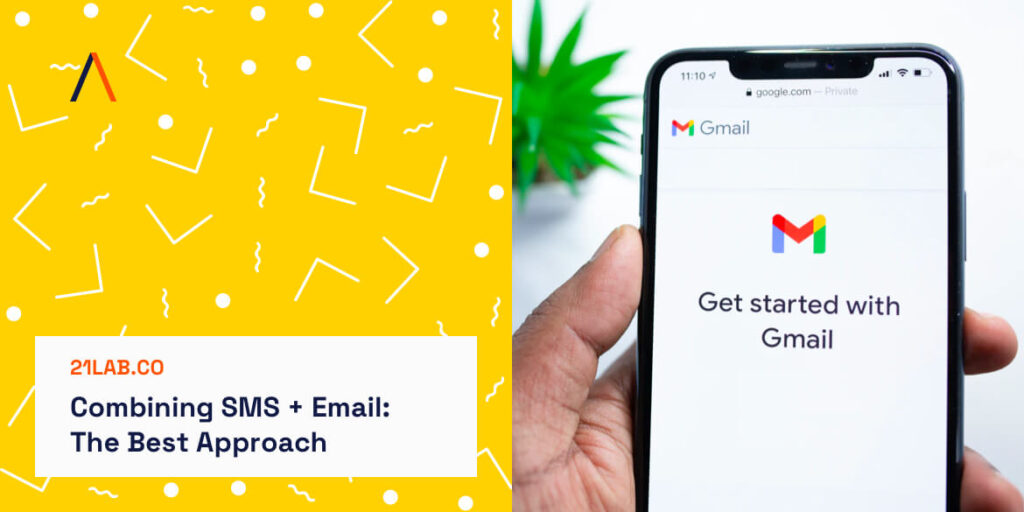Email marketing has long been one of the most powerful digital marketing channels available to brands looking to maximize their revenue and connect with leads and customers. But recently, a new player has entered the space: text message, or SMS, marketing.
Many marketers have found themselves scratching their heads on how to not only incorporate SMS into their existing digital marketing agency’s efforts, but also on how to ensure it complements their email strategy. In this article, we’ll be walking through how to combine your email and SMS marketing strategies to maximize results!
The Differences Between SMS + Email
More and more companies are utilizing SMS marketing in addition to email marketing. There’s no doubt that SMS marketing is a powerful tool, boasting engagement rates 6-8 times higher than email. It’s important to understand the differences between email SMS to optimize your internet marketing services.
Email → is a great medium for sending longer, richer messages that include images and attachments. Emails provide more opportunities to convert than SMS, as emails can include more links, CTAs, and stories. This allows marketers to focus on educating and nurturing. Email is perfect for sending newsletters, tips, and testimonials. Research shows that 90% of users check their inbox at least once a day. Emails have an average open rate of 20% and an average click-through rate of 2.5%, and email marketing returns $42 for every $1 spent.
SMS → is the perfect communication channel for concise, timely information or discounts. SMS has much higher engagement metrics than email, with a 98% open rate and 29% click-through rate. SMS is great for promotions, but not ideal for content aimed at educating and nurturing. SMS has a 160 character limit, creating a need to keep messages short and concise. SMS marketing is also more expensive than email marketing. Use SMS best practices for limited product offers, reminders, urgent updates, purchase confirmations, and promotions.
SMS Best Practices
There’s no doubt that SMS marketing is one of the most personal forms of marketing, which reinforces the need to tread carefully. How can you engage your customers rather than annoy them?
- Get permission: Similar to email marketing, it’s incredibly important to make sure you have the contact’s permission before you contact them. Every single person you send a text to must have opted in to receive messages from you. This means requesting customers opt-in via an online form or inviting them to text a word to a phone number or shortcode. It’s also critical that you provide contacts opportunities to opt-out from receiving your messages.
- Ensure your messages are time-sensitive: Make sure to take time zones into consideration when sending out messages. It’s important that your SMS provider automatically sends your texts to your customers at the right time, depending on their time zone. This ensures that your text won’t annoy anyone in the middle of the night.
- Keep your copy short and to the point: No one wants to receive a marketing text message that’s a paragraph long. Keep your copy short, to the point, and easy to read.
- Consider using an auto-responder: Using an auto-responder to engage in conversation with your customers can be extremely powerful. By giving your customers the opportunity to ask questions, give feedback, or seek more information, you’re creating a strong foundation for your customer relationships.
- Resonate with your audience segment: When writing a text message, put yourself in the shoes of your audience segment. What kind of content do they want to receive? What sales or products might be important to them? Personalization is key.
- Include an actionable CTA: What is the intended result of your SMS campaign? Is it to drive traffic to your website? Do you want people to take advantage of your sale? Whatever your goal may be, it’s crucial that you be specific about what action you’d like your audience to take. Include a link to your product page and be direct in your wording. Use phrases like “Check out our newest edition!” or “Shop now before it’s too late!”
- Limit how often you send: The easiest way to turn a customer away is by spamming them with text messages. While the frequency of your text messages will depend on your goals, we recommend aiming to send two texts per week.
- Consider your SMS provider: When choosing an SMS provider, you’ll want to pick one with an extensive carrier network that will allow you to reach customers in many geographic areas. You’ll want a provider that can grow with your SMS marketing and can send text and picture messages quickly and efficiently.
Striking a Balance
Striking a balance between email vs text is crucial to marketing for your business, especially in the world we live in today. Email has been the true-and-tried method of mass marketing communication. But now with mobile devices in the picture, SMS is now a very efficient and effective way to communicate with your customers. The average person spends 5.4 hours a day on their mobile device. To put it more into perspective, the average person takes 90 minutes to respond to an email and 90 seconds to respond to a text. Crazy right? Understanding when to use SMS and when to use email is very important.
The Best Approach for Combining Both Methods
Email marketing should be used for longer, richer messaging that includes photos and important links. Good examples of when to use email includes order confirmation, newsletters, product launches, promos, or educational content. These messages should not be very time sensitive and are usually saved for future reference. Depending on the industry and how promotion heavy the brand is, the sends per month is going to vary. Usually, it ranges from 4-10 sends a month.
On the other hand, SMS marketing is best for short and concise messages that are time sensitive. Good examples of when to use SMS includes tracking information, flash sales, and restocks. It is important to cap your sends for text marketing to 1-2 each week. You do not want to be an inconvenience to your customers.
As you can see, both email and SMS marketing have their strengths. The use of them together can leverage your business over its competitors while you build brand awareness and build meaningful relationships with your customers.
Source: https://powerdigitalmarketing.com/


